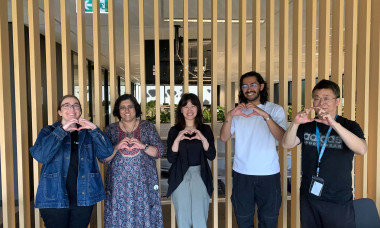Is ‘workism’ the future of work for millennials?
Oren Cass, the author of the book The Once and Future Worker, put forward the view that as a society we've created and popularised the idea that the meaning of life should be found in work. So much so that we now tell aspiring young workers their work should be their passion. As a society, we repeatedly tell them through the likes of media, commencement addresses and general pop culture: "Don't give up until you find a job that you love! You should be changing the world!"
It would seem early 20th century economists failed to anticipate that work would one day become a means of identity production, instead of simply material production. Yes, it was clear to them work would remain a necessity for the poor and middle class who would need the material means to survive and then eventually prosper. But for those with more choice and a quality education, those early economists failed to foresee that work would turn into a kind of -ism, or something akin to a religion promising identity, community, and transcendence. It's called workism.
Does ‘workism’ work for millenials?
Born in the last two decades of the 20th century, the millennial generation came of age when the newly-minted multi-millionaires of the Silicon Valley tech sector emerged. Their success appeared to have combined a do-what-you-love ethos with fulfilling the lofty dreams of a Utopian calling. In other words, millennials came of age when workism started fueling the zeitgeist.
According to Malcolm Harris in his book Kids These Days, what sets millennials apart as a generation is that they went through a childhood where they were exposed to opportunities that allowed them to check every box of the success sequence, including extracurricular overachievement. This type of exposure showed them it was possible to make lots of money and be happy pursuing their calling.
Several studies in recent years have shown the result is that millennials now look for meaning at work. One Gallup survey concluded that while millennials care about their income, it is apparent that for this generation a job is more than a paycheck. Work, for them, is also about purpose.
So, what does the embrace of workism actually mean for today's millennial workers?
I’ve been in a position to witness the evolution of ‘workism’ throughout my career in both the technology and education sectors in the US and in Australia. In fact, this culture has strongly influenced my outlook and has shaped my own past experience of work. However, from personal experience, I’ve also learned that the gospel according to workism of "Your dream job is out there, so never stop hustling" can also be a blueprint for physical, mental, and emotional exhaustion.
The reality is - as we are coming to understand through research and experience - long hours spent at work do not guarantee more productivity or creativity. Long hours of all work and no play tend to make people tired, stressed, and sick. And yet, the stories about the benefits of workism still thrive, buoyed as they are by the extreme wealth created by today's ‘decacorns’ in Silicon Valley. There are people living the millennial dream of the workism ideal right now. So why not today’s millenials?
The media that surrounds us - both mainstream and social - tells us our personal spaces and our selves should be optimised as well as our careers. The inevitable burnout at work now follows us to our homes, then back again. Self-care, the most common prescription to millennial burnout, is now an $11 billion industry that touts self-optimisation in the form of lifestyle and bio-hacking. But perhaps does not alleviate the burnout cycle as much as maintains it.
Some difficult questions need to be asked across education and employment. Is a society that syphons its individual need for self-actualisation into salaried work where purpose trumps paychecks setting itself up for mass disappointment? Are we creating our own collective anxiety and inevitable burnout? More importantly for millennials, is there another pathway forward in the future of work?
‘Workism’ in the future of work
According to a 2017 report by Deloitte, the millennial generation is projected to make up 75 per cent of the workforce by 2025. However - at least across the developed world - we know these better educated millennials are now plagued by higher levels of unemployment and underemployment than other age groupings. They are also experiencing the highest rate of stress and mental illness.
Add to this that, in the dawning age of artificial intelligence and machine learning, it has been suggested we may be heading towards a ‘workless future’ where machines take over workplaces. This has been ongoing fodder for science fiction writers and futurists alike, who have explored the possibility that machines will eventually free us from the toil and drudgery of work, even while they intertwine this with the fear that in doing so, machines will also rob us of our agency.
Where does this leave our millennials in the future of work?
Firstly, it raises questions for the education and employment sectors. For example, even though there is a high rate of unemployment for millennials who are supposedly better educated, employers say they are still struggling to find workers with the right qualifications. According to Manpower Group, 45 per cent of 39,195 employers in 43 countries cannot find the skills they need in 2018. What solutions can training colleges and universities of the 21st century provide when the skills being demanded by employers in modern-day industry are those that are necessary to survive in very competitive business environments? Will they adapt to ensure millennials are prepared?
For individuals, the questions are different. Perhaps for millennials and the generation that follows them, the key is not so much about doing something they are passionate about at the onset, but in the acquisition of timely in-demand skills that employers actually want now and into the future.
What if acquiring a lifelong learning mindset - constantly being on the lookout for things that make your soul come alive and then pursuing those things diligently throughout the different stages of your life - might actually be the better way to go? Perhaps young people are routinely mistaking the edict of ‘find your passion’ to mean that they must pick their interest early and stick with it.
A 2015 group of studies conducted at the University of Michigan on adults’ views toward passions suggests that those who think passions can be found pick jobs that fit them well to begin with. They are the types of people who will prioritise enjoyment over paychecks. In contrast, the people who think passions are developed prioritise other goals over the promise of immediate enjoyment at work. They are usually the workers who grow to better fit their careers over time.
The idea that people’s core interests do not change over time admittedly seems counter-evolutionary. It can be even be said that such a fixed mindset is not particularly creative. Something I have learned through personal experience is that doing something well and having the resilience to stick with it long enough to gain expertise in it is an invaluable skill in itself. In the fast-changing and uncertain future of work, it may just be that this is the type of skill that future proof’s today’s millennial workers to be better ready for the future of work, however that may look like.






